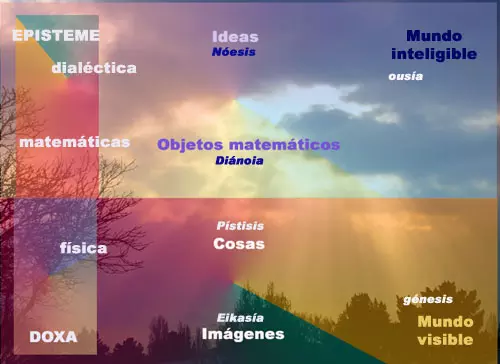The theory of ideas presents a serious gnoseological problem: if ideas belong to another world other than the world in which we live, how is it possible to access them?
To that question, there are three possible answers:
Things mimic ideas
Ideas are in communication with each other
The soul is an intermediate reality between things and ideas
Since it would be useless to look for what is already known, or what is not known (we would not know what we are looking for or recognize it when we find it), in reality, to remember is to find what we already know: to know is to remember.
According to Phaedron and Phadrus:
The soul had to know the Ideas in an earlier existence (separated from the body) and that knowledge was possible thanks to the affinity (semjante knows the like) with the Ideas.
Since things imitate Ideas, sensible knowledge serves as an occasion for remembrance, which in turn serves to reduce the idea of multiplicity of sensations to the ununited.
In subsequent dialogues, Plato seems to set aside the theory of reminiscence and concentrate on dialectics.

= = == =
As in parmenides, two general forms of knowledge are distinguished:
The opinion (doxa)
Science (episteme)
Opinion is the sensitive knowledge of things or the world of what is spawned (genesis) and belongs to the “Visible World”. Science can only deal with the “intelligible world” of ideas, that is, about the Self (ousia), eternal and immutable.
Imagination (eikasy) is the lower degree of knowledge and feeds on sensible objects received by belief (pistis), a field studied by physics. Plato did not consider physics a true science since it deals with moving objects.
The last two degrees of knowledge are the discursive reason of the mathematician (diánoia) and the proper intelligence of the dialectic (noesis), which is supposed to be the true knowledge of ideas.
Mathematics uses a descending discursive method that goes from hypothetical to conclusions using visible figures (geometric figures) while dialetics uses an ascending method where hypotheses are steps to a hypothetical principle without using images.
= = == =
Actually, Plato doesn't tell us how you get to know ideas. It only says that the soul has capacity for it and that it is about learning to look in the right direction. And if you have to prepare to ascend, mathematics is the first step. But the mathematician is still tied to the sensitive world, since it requires visual representations. To abandon sensitive images is the task of the dialectic, that is, of the philosopher.
Platonic love (eros) is also an ascending type process. It could be defined as an emotional dialectic.
In the Fedron it can be read in a fragment that if in the dialectic asection seems to be realized only from inferior ideas to the supreme Idea, in love it is a ascension from things to the supreme Idea (Beauty or Good) without talking about a transit through intermediate Ideas. In love, it is things that serve as steps (hypothesis) to the idea, because they participate according to their degree, in the Idea.
Platonic love is nothing but an ascension to Beauty.